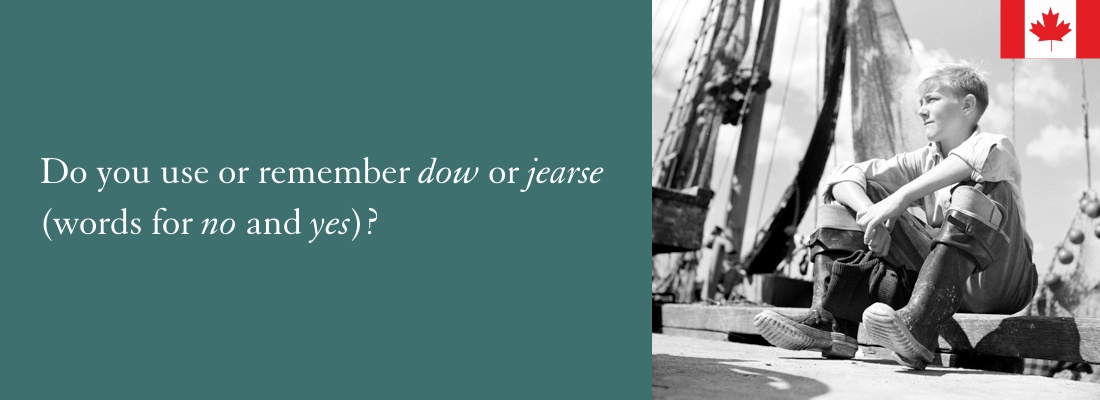
Please take the survey below
Do you use or remember “dow” or “jearse,” words for “no” and “yes”? If so, I would like to hear from you.
I am researching the words for “no” and “yes” in New England, Nova Scotia and other parts of North America settled by people from New England. Ayuh is already quite well known, but colonists from the East of England may have brought “dow” and possibly “jearse” to the Northeast in the seventeenth century. Four hundred years later, this distinctive feature of Eastern English – emphatic words for “no” or “yes” – still survives in England and North America today.
Gerald E. Lewis gives an example of “daow” in How to Talk Yankee:
“Did you get your deer yet?”
“Daow, I can’t even see one.”
And John Gould, author of Maine Lingo, tells the apocryphal story of some Maine lobstermen in federal court for price fixing. Washington lawyers asked a witness a foolish question, to which the witness replied, “Daow!” The court recessed so that the lawyers could find out what “daow” meant, and how to spell it.
In the East of England, where I grew up, we still use “dow” and “jearse” today. However, they are not recorded in the Oxford English Dictionary or the Survey of English Dialects. Nor were they recorded by the Linguistic Atlas of New England; but the Dictionary of American Regional English cites daow, daowd, or dow in Massachusetts, Vermont, Maine, and possibly New York State. There is also day-oh in Rhode Island and daow in New Hampshire. For “jearse,” there is jyes and djess in parts of New England and jass in Upstate New York.
The aim of my research is to find out how widespread “dow” and “jearse” are in England, the U.S. and Canada, how people use them, their etymology, and how they came to North America.
I was recently a guest on BBC Radio, talking about “jearse” and “dow” in Eastern England. And last spring I gave a talk on “jearse” and “dow” at Cambridge University. To read about my research on BBC.com, click here. To read about the connections between the East of England and New England, and why the Northeast might preserve the speech of the Eastern England from 400 years ago, see here.
I am writing a book chapter on “jearse” and “dow” to be published next year and would like to hear from you about “dow” and “jearse” in Canada.
The Dow Jearse Survey in the media
BBC.com, Stephen Howe’s mission from Japan: Is that a ‘jearse’ or a ‘dow’?, 20 August 2015.
BBC Radio Suffolk, Studio guest on the Lesley Dolphin Show, 17 August 2015.
BBC Radio Cambridgeshire, Interview on Sue Dougan Lunchtime Live, 29 July 2015.
BBC Radio Norfolk, Studio guest on the Nicky Price Breakfast Show, 19 August 2015.
BBC Radio Lincolnshire, Studio guest on Melvyn in the Morning, 21 August 2015.
Cambridge News, ‘Do you speak Ely? If “jearse”, he wants to hear from you…’, January/February 2015.
Fukuoka University News, 人文学部英語学科スティーブン・ハウ准教授が英国のBBCラジオに出演, website in Japanese, 31 August 2015.
Eastern Daily Press, ‘Yes or no…help us shed light on two little words’, column by Peter Trudgill, 7 September 2015.
Please take the survey below
If there is any problem with this form, please use this page instead